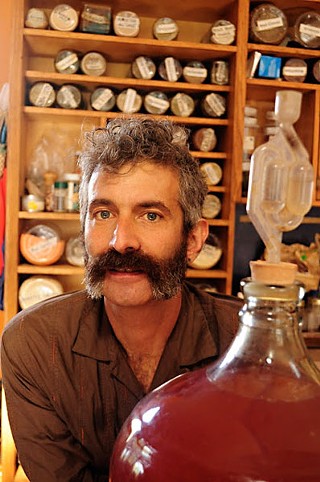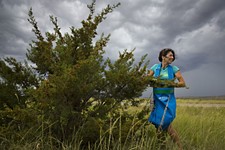Back to Life
Sandor Katz and fermentation's new culture
By Veronica Meewes, Fri., Nov. 7, 2014
When Sandor Katz moved to rural Tennessee from bustling New York City, he grew his first garden and immediately started learning from the land. "I had all sorts of revelations," he says, "and one of them was that all the cabbage is basically ready at the same time. And, when I realized that, I thought, 'I better learn how to make sauerkraut.' It was purely practical."
Pretty soon, he was making country wines with blackberries and elderberries and crafting goat cheese and yogurt from the milk produced by the community goats. "It just led me into a full-on exploration and obsession with all things fermented," he recalls.
Katz is now one of the primary fermentation experts in the country and the author of three books (The Revolution Will Not Be Microwaved, The Art of Fermentation, and Wild Fermentation). He will be visiting Austin to appear as the keynote speaker at the Austin Fermentation Festival at the Le Cordon Bleu Austin campus on November 15. The event, which is hosted by Texas Farmers' Market and sponsored by Whole Foods Market and Le Cordon Bleu, will feature a day of free workshops, as well as a community culture swap, book sale, farmers' market, live music, and food.
Although Katz has been traveling the world to speak at educational events just like this, this will be the first one of its kind in Austin, which is a bit surprising, considering our city's love of farm-to-table menus and DIY food culture. Katz sees food fermentation as a natural progression from the revival of farmers' markets and a renewed interest in locally made products.
"After a couple of generations of people being thrilled to not have to do so much work for their food, not have to toil in the field or in the kitchen ... there's been growing numbers of people recognizing that the food available to us in great abundance in supermarkets is often nutritionally diminished, is produced by methods that are often environmentally destructive, and that the removal of food production from our communities has been economically devastating," says Katz. "So people are just wanting to become more connected to their food – wanting to understand where their food comes from and how it's produced, and maybe even have a hand in doing that themselves."
Events such as next week's show home gardeners and cooks just how easy it is for them to experiment with fermentation. The process doesn't require a sterile setting or a particular temperature, and special materials, tools, or experience are not necessary. Anyone can simply and safely ferment foods in their own home, resulting in products like yogurt, kombucha, kimchi, sauerkraut, cheese, beer, and wine.
For those who are squeamish about getting started for fear of disease, Katz assures that there is no case history for illness associated with fermentation. "The brilliant thing about acidification as a strategy for food safety is that none of the kinds of organisms that have been associated with disease can survive in an acidic environment," he says. "People's fear of fermentation is really based on a fear of canning ... But with living, fermented foods, there's just no issue."
As a preservation method, fermentation has been traced back as far as the Stone Age. Its process of breaking down nutrients into more easily digestible forms, while creating new nutrients in the process, is why many people turn to fermented foods for their purported health benefits. Katz, who's been living with AIDS since the Eighties, has experienced many of these benefits firsthand. However, he is quick to point out, "I don't think any individual could tell you the long-range benefits of what they do because we're never doing just one thing. So it's purely anecdotal."
In other words, while he incorporates fermented foods into his daily diet, he also eats fresh and local ingredients as much as possible, takes anti-retroviral drugs, and maintains an exercise regime. But he notes that he can feel a palpable difference in his overall digestion when he does not eat ferments for several days.
"I think that they are very supportive of good health," says Katz. "I think that predigestion enables us to get more nutrients out of our food. I think live bacterial cultures can improve digestion, improve nutrient assimilation, improve overall immune function, improve mental health potentially – improve lots of aspects of our functionality. But that doesn't mean that eating a particular food is going to cure a particular disease."
And while no panacea, the traditions of fermentation are very important to living. "Fermented foods are very culturally important," explains Katz. "The word 'culture' actually comes from the Latin word for cultivation, so our earliest notions of culture had to do with information about cultivation and agriculture. I would argue that agriculture would not be possible without fermentation. How could we ever invest our energy into crops that are ready at a certain moment of the year if we didn't have some insight into how to use those crops to feed us through the rest of the year?"
Katz studied history – not science – during his time at Brown University, so his vast knowledge of fermentation is primarily self-taught from extensive reading and travel. He hopes the workshops and presentations at the Austin Fermentation Festival will inspire others to start or further their own exploration of living foods. "It's really great for people in a community to come out and be inspired by what one another are doing and share cultures with people who don't know where to find them," says Katz. "And really just network so people feel like they have a sense of support and can look to for information and feedback because it can be intimidating and scary for people sometimes."
Intimidation aside, Katz doesn't see an end to the current interest in fermentation. "Once you start interrogating your food and thinking about how things are produced and where they come from," says Katz, "then inevitably fermentation is part of the story."
The Austin Fermentation Festival will be held Sat., Nov. 15, from 11am-4pm at the Le Cordon Bleu Austin campus (3110 Esperanza Crossing #100) in the Domain. Free workshop info here. More festival info here.









